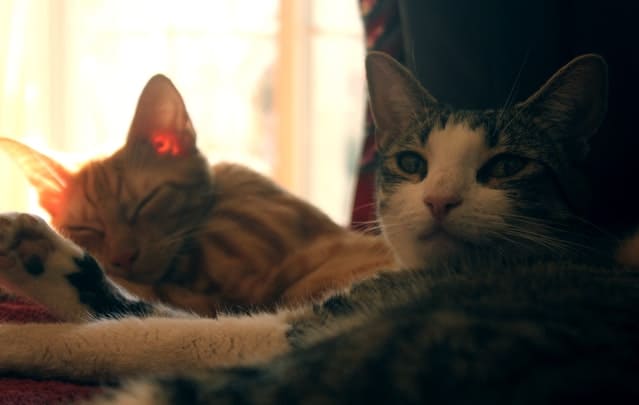
Coronavirus is a virus that can also occur in cats. Let’s see what the symptoms and risks are for your beloved feline.
These days the future of the human being is at risk due to a virus that originated from China, the Coronavirus, which can be transmitted from person to person.
Coronavirus can also infect our feline friends even though it is a different virus that has been known for many years. Let’s see together how this virus can be transmitted in cats, what are the symptoms and the risks for the cat.
Feline coronaviruses: FECV and FIPV

There are two types of coronavirus in cats, feline enteric coronavirus (FECV) and feline infectious peritonitis (FIPV). Feline enteric coronavirus affects the digestive system of the cat, causing gastroenteritis in the cat. Symptoms of this disease are:
- Diarrhea in cats
- Vomiting in cats
- Abdominal pain
- Weight loss in cats
- Lethargy
- Fever
The FECV virus is excreted from the cat’s feces, which is the main source of the infection. So it is advisable that the cat litter box is cleaned every day and especially if you have more cats it is necessary to buy a litter box for each cat.
Furthermore, the main feature of this virus is its mutation in feline infectious peritonitis FIP, which could lead to the death of the cat as the virus attacks the immune system and vital organs.
Feline coronavirus: FIPV
Feline Coronavirus FIPV or feline infectious peritonitis, can be found in young or elderly cats as they have a weakened immune system and the infection occurs through the animal’s feces.
The symptoms of feline infectious peritonitis differ depending on the age of the cat, the immune system of the cat, and the organs that the virus affects. The virus can be of two types, wet and dry. Here are the symptoms of both types of viruses that can affect the feline.
Wet virus symptoms
- Lethargy
- Anorexia
- Weight loss
- Diarrhea
- Respiratory difficulties
- Eyes full of tears
- Sneezing in the cat
- Nasal discharge
- Granulomas on the organs of the body
- Severe fever
- Abdominal swelling
- Fluid in the chest cavity
Dry virus symptoms
- Diarrhea
- Anemia in cats
- Jaundice
- Depression
- Inflammation of the eyes
- Poor growth (if it affects kittens)
- Severe fever
- Neurological symptoms
- Loss of vision
- Loss of balance
Feline Coronavirus Diagnosis and Treatment
It is very difficult to diagnose Coronavirus in cats, as there is no test that can detect it. In addition, the symptoms can also mimic other diseases making a diagnosis difficult for the vet.
The latter will ask you about your cat’s medical history, the symptoms that the cat has and also if your cat lives with other cats.
I will also carry out specific analyzes which, however, will not be able to communicate if the Coronavirus, if it were present in the feline, has already changed into peritonitis.
There is no real treatment for feline infectious peritonitis, you can only treat the cat to extend the cat’s life by a few months.
The best way to prevent your cat from contracting Coronavirus is to keep him away from infected cats and to constantly clean the cat’s litter box.






